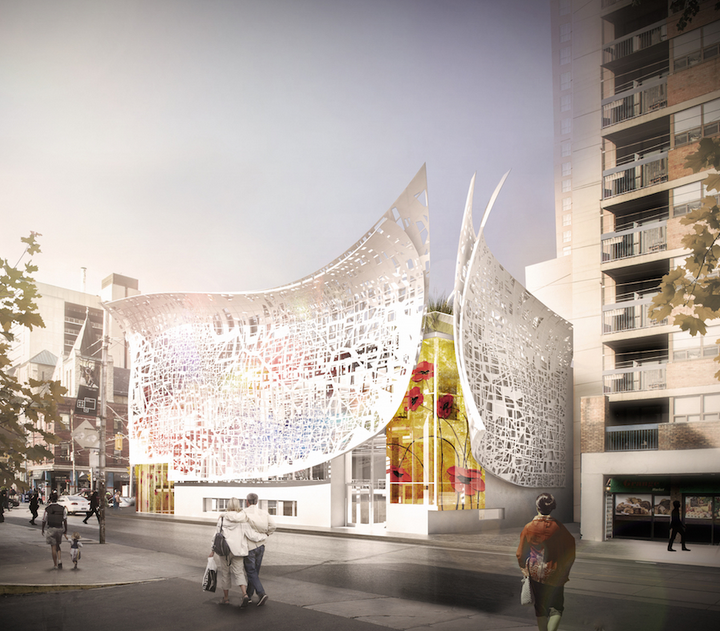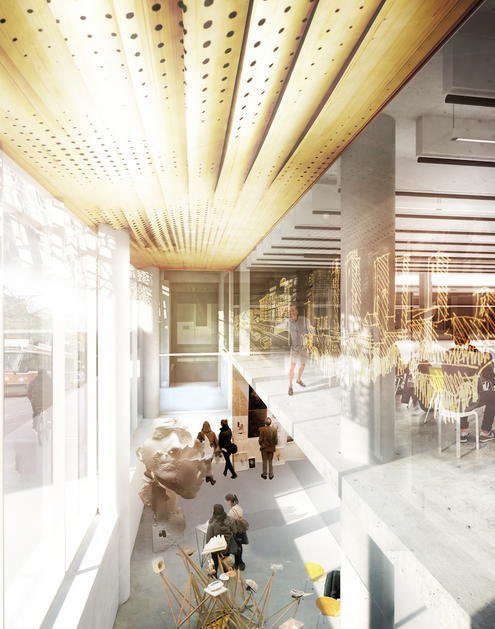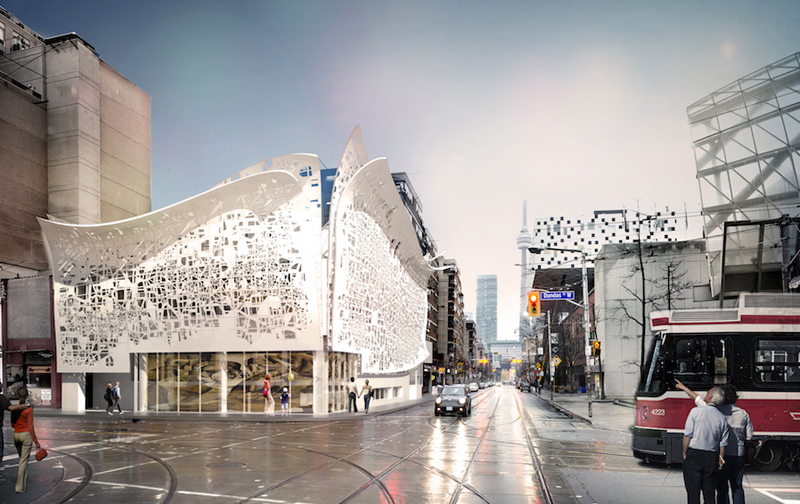OCAD U, formerly known as the Ontario College of Art and Design, wants the surrounding community to reimagine its main office building as an interactive gateway for its campus in Toronto.
To achieve that goal, the university commissioned a $6 million renovation for that 16,300-sf building, whose exterior will be shrouded with a diaphanous white veil of water-jet-cut aluminum panels on metal framing secured by structural steel outriggers.
The façade that Bortolotto Design Architect has proposed would fan out from the edges of the building, like it’s opening up to visitors. The veil will also provide street-level views of student artwork.
ArchDaily reports that the college’s Digital Media Research Lab is developing an app to read information from specific sections of the façade, so pedestrians will be able to learn about different local artists.
OCAD U is rebranding the building as The Rosalie Sharp Pavilion, named after benefactors Rosalie and Isadore Sharp, who donated $3 million of the project’s budget. The college is paying the rest. The office building’s interior space will be converted into a flexible-use, student-oriented facility that includes minimalist studios and rooms for meetings and events.
The Building Team on this renovation also includes Blackwell (SE), ENSO Systems (mechanical/electrical engineer), and Halsall Associates (sustainability consultant). The contractor has yet to be chosen, and the groundbreaking date still needs to be set.
Bortolotto reportedly came up with this patterned veil design by mapping data about Toronto’s artistic community in order to position OCAD U as the nucleus of that activity, and as a cross-disciplinary, collaborative institution.
“The pattern inscribed in the scrim is defined as the notion of OCAD U as densely embedded within the urban fabric of the city,” Tania Bortolotto, the firm’s president, told Daily Commercial News.
The Arch Daily report notes that the peel-away edges of the pavilion “gesture” toward the nearby Art Gallery of Ontario, designed by Frank Gehry; as well as the university’s Sharp Centre for Design, designed by aLL Design’s Will Alsop.


Related Stories
| Aug 11, 2010
Living and Learning Center, Massachusetts College of Pharmacy & Health Sciences
From its humble beginnings as a tiny pharmaceutical college founded by 14 Boston pharmacists, the Massachusetts College of Pharmacy & Health Sciences has grown to become the largest school of its kind in the U.S. For more than 175 years, MCPHS operated solely in Boston, on a quaint, 2,500-student campus in the heart of the city's famed Longwood Medical and Academic Area.
| Aug 11, 2010
Giants 300 University Report
University construction spending is 13% higher than a year ago—mostly for residence halls and infrastructure on public campuses—and is expected to slip less than 5% over the next two years. However, the value of starts dropped about 10% in recent months and will not return to the 2007–08 peak for about two years.
| Aug 11, 2010
Team Tames Impossible Site
Rensselaer Polytechnic Institute, the nation's oldest technology university, has long prided itself on its state-of-the-art design and engineering curriculum. Several years ago, to call attention to its equally estimable media and performing arts programs, RPI commissioned British architect Sir Nicholas Grimshaw to design the Curtis R.
| Aug 11, 2010
Setting the Green Standard For Community Colleges
“Ohlone College Newark Campus Is the Greenest College in the World!” That bold statement was the official tagline of the festivities surrounding the August 2008 grand opening of Ohlone College's LEED Platinum Newark (Calif.) Center for Health Sciences and Technology. The 130,000-sf, $58 million community college facility stacks up against some of the greenest college buildings in th...
| Aug 11, 2010
University of Arizona College of Medicine
The hope was that a complete restoration and modernization would bring life back to three neoclassic beauties that formerly served as Phoenix Union High School—but time had not treated them kindly. Built in 1911, one year before Arizona became the country's 48th state, the historic high school buildings endured nearly a century of wear and tear and suffered major water damage and years of...
| Aug 11, 2010
Cronkite Communication School Speaks to Phoenix Redevelopment
The city of Phoenix has sprawling suburbs, but its outward expansion caused the downtown core to stagnate—a problem not uncommon to other major metropolitan areas. Reviving the city became a hotbed issue for Mayor Phil Gordon, who envisioned a vibrant downtown that offered opportunities for living, working, learning, and playing.







